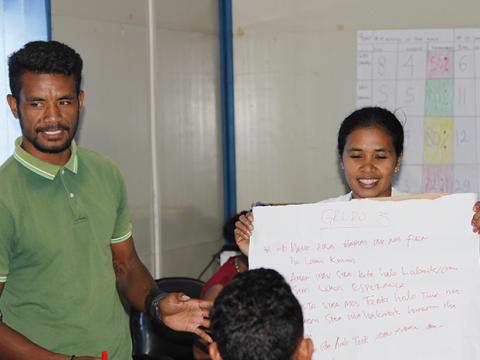A family reunited

Celestino, 27 years old from Aileu, used to experience conflict at home. Celestino expressed his feelings sadly. "I saw with my own eyes, my parents had problems, including shouting and not accepting each other’s ideas, and it led to them living separately between 2012 and 2014."
Celestino's younger sister, Juliana, aged 15, shared the same feelings. "As long as our parents lived separately, I immediately felt negative effects because I could not get the love and affection of my parents. I lived with my mother, and my brothers and sisters just came to visit us."
Celestino convinced his mother to return home, however his parents still could not communicate with each other and their issues remained unresolved.
"I tried to invite my uncle as he was also the head of our sub-village to sort this out. However, the problem continued recurring because there was still a sense of resentment among them," Celestino said.
Celestino joins Ekipa Hadomi Família
World Vision worked with communities in Aileu to raise awareness and address gender-based violence issues at the community level through Community Action Teams (Ekipa Hadomi Familia), with support from religious and community leaders and local NGOs.
In 2016, Celestino received training on gender, domestic violence, conflict resolution and physical and sexual-related violence through the Rural Youth Unifying Group Centre. This group also received training from World Vision. The centre then elected Celestino to become a member of the Ekipa Hadomi Família (EHF).
After the training, Celestino had sufficient knowledge to help solve his family’s problems. "I advised my parents to attend the gender training. I observed that while on the training, my parents were very happy and wanted to solve their own problems because they thought that it was not good for the family and their children’s future,” he said.
Celestino’s father, João, 54 years old, shared how his family life has changed. "My family showed an unethical example to the community because the neighbours always knew our internal problems, and this made us very embarrassed. However, today we live in peace, happiness and have no more problems, because our son advised us to attend the gender training. I am also very proud after being involved in the training because my mentality has changed. I believe we stand before a new era of growth, prosperity, and abundance.”
Celestino’s mother, Joana, 48 years old, added, "My past problem was so serious that I decided to break away from my family, but after the training, my mentality and thinking has changed. I realise that family is a wonderful hope for my life.”
Celestino said the training provided by World Vision has transformed a culture of conflict into a culture of peace within his family. "Now there are no more problems and my family has been living peacefully," he said.
Ekipa Hadomi Família an effective model to address gender-based violence
Ekipa Hadomi Família is an innovative program which World Vision first implemented in 2015 in Aileu Municipality. At the end of the project, the community said that they had learned an effective solution to gender-based violence through the Ekipa Hadomi Família that World Vison established in their respective villages.
World Vision’s Gender Manager, Abigail Howe-Will said the introduction of Ekipa Hadomi Família groups at the outset of the program showed significant gains in terms of community members reporting having learned about gender-based violence issues from the groups.
“Almost 80 percent of the respondents have learned about the impact of violence against women in the communities. Most of the people had learned about it from an NGO/EHF,” said Abigail.
World Vision’s Reducing Gender-based Violence project, funded by the Australian NGO Cooperation Program (ANCP) under the Australian Government’s Department of Foreign Affairs and Trade (DFAT), ended in June 2018. The project reached 1,095 direct and 11,912 indirect beneficiaries in 30 communities in Aileu, Timor-Leste.
Read the Reducing Gender-Based Violence project evaluation report summary.